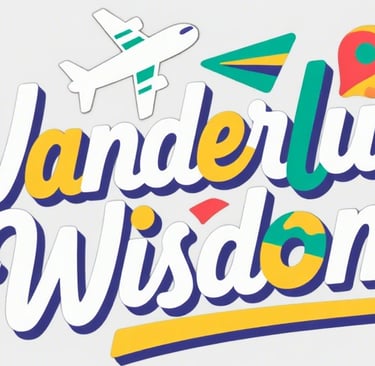Turkey: Bridging East and West - Cultural and Religious Nuances
RELIGION
6/16/20258 min read


Introduction
Turkey occupies a strategic and unique position as a transcontinental country, where Europe and Asia converge. This geographical location not only serves as a natural bridge between two continents but also contributes significantly to Turkey's historical and cultural significance. As a crossroads of civilizations, it has been a pivotal site throughout history, influenced by numerous empires, traders, and cultural exchanges.
The historical relevance of Turkey dates back to ancient times, with cities such as Troy and Byzantium playing vital roles in the development of human civilization. The rich tapestry of cultures, religions, and traditions that coalesce within Turkey's borders reflects this ancestral legacy. The country is characterized by a diverse population consisting of various ethnic groups, including Turks, Kurds, Armenians, and Greeks, all of whom contribute their distinct customs and beliefs to the overall cultural landscape.
Furthermore, Turkey's religious heritage is equally varied, with Islam predominating as the primary faith. However, the country has also been home to several significant religious minorities, including Christians and Jews, creating a unique religious pluralism. This diverse religious composition has shaped the moral and ethical dimensions of Turkish society, influencing everyday life and celebrations.
The coexistence of numerous cultural and religious identities has led to a dynamic society where East meets West in multifaceted ways. From architecture to cuisine, the blending of different influences can be observed, rendering Turkey a fascinating example of how diverse elements can harmoniously coexist. This intriguing synthesis of cultural identities not only defines the Turkish experience but also enriches global discourse on identity, coexistence, and cultural interplay.
Historical Context: The Legacy of Empires
Turkey's geographic position as a bridge between the East and West has created a complex historical tapestry, woven from the influences of various empires, notably the Byzantine and Ottoman Empires. The Byzantine Empire, with its capital in Constantinople (modern-day Istanbul), was a cultural powerhouse that played a significant role in preserving and cultivating classical knowledge during the Middle Ages. This Byzantine legacy is evident in Turkey's architecture, language, and art, which reflect a blend of ancient Greek and Roman influences along with Christian traditions. The infusions of these influences into the societal fabric laid the groundwork for the diverse cultural identity seen in Turkey today.
Following the fall of Constantinople in 1453, the Ottoman Empire emerged as a dominant force for centuries, profoundly shaping the region's sociopolitical landscape. The Ottomans not only expanded their territory but also embraced a multitude of cultures, languages, and religions within their realm. This multiculturalism is reflected in the architectural marvels of the era, such as the majestic Hagia Sophia, which transitioned from a church to a mosque, representing the coexistence of various faiths within Turkish society. The Ottoman administrative system also promoted relative religious tolerance, which has impacted present-day Turkish attitudes toward cultural diversity.
Today, the echoes of these empires linger throughout Turkey's cultural landscape. The interplay between Islamic practices, inherited from the Ottoman period, and secularism, a principle established during the early 20th century under Mustafa Kemal Atatürk, has led to a unique religious dynamic. Consequently, Turkey grapples with the challenge of maintaining its rich heritage while adapting to modern influences. This historical legacy continues to inform the social practices and beliefs of contemporary Turkey, reinforcing its identity as a nation that bridges Eastern and Western traditions.
Cultural Diversity: A Mosaic of Identities
Turkey, positioned at the crossroads of Europe and Asia, serves as a remarkable example of cultural diversity, characterized by its rich tapestry of ethnic groups, languages, and traditions. This diverse heritage stems from its historical significance as a hub for numerous civilizations, including the Hittites, Romans, Byzantines, and Ottomans, each leaving an indelible mark on the cultural landscape. Today, Turkey is home to various ethnic groups, such as Kurds, Armenians, Greeks, Arabs, and many others, each contributing their unique customs and practices to the nation's identity.
The linguistic diversity in Turkey is also noteworthy, with Turkish as the official language, yet several minority languages are spoken across regions. Kurdish, Arabic, and Zazaki are amongst the notable languages reflecting the country’s ethnic variety. This multiplicity of languages adds depth to the cultural fabric, allowing for a multitude of expressions in literature, folklore, and everyday communication. The interplay between Eastern and Western influences is particularly prominent, manifesting uniquely in art, music, cuisine, and festivals.
Art in Turkey often reflects a blend of traditional motifs and modern expression. The exquisite craftsmanship seen in carpets, ceramics, and calligraphy demonstrates this cultural amalgamation. Similarly, Turkish music features a fusion of styles, from classical Ottoman music to contemporary pop, showcasing the country’s dynamic artistic evolution. Cuisine serves as a further testament to this cultural diversity, where regional dishes highlight local produce and historical interactions. Festivals, ranging from the spiritual to the secular, celebrate various traditions, emphasizing community bonding and the coexistence of different cultural narratives.
In a pluralistic society like Turkey, navigating cultural identity is complex. The interactions among diverse groups foster a vibrant social environment while also challenging individuals to find their place within this mosaic. The resulting cultural landscape is a vivid representation of Turkey's ability to unite various influences, creating a unique identity grounded in rich historical significance and contemporary realities.
Religious Landscape: A Confluence of Faiths
Turkey's religious landscape is characterized by a rich tapestry of beliefs and practices that reflect its unique position at the crossroads of East and West. The predominant faith is Islam, where the majority of the population identifies as Muslim, predominantly following Sunni traditions. This religious affiliation significantly influences cultural customs, from daily prayers to the practice of Ramadan, shaping not only personal identities but also communal ties. The calls to prayer echo throughout cities, reminding citizens of the central role that faith plays in their daily lives.
However, Turkey's religious diversity extends beyond Islam. Christian communities, including Orthodox, Catholic, and Protestant denominations, remain integral to the cultural heritage of the country. Historical sites, such as ancient churches and monasteries, serve as reminders of Turkey’s Christian past and continue to attract visitors and pilgrims alike. Moreover, the presence of minority religions, including Judaism and various sects such as the Alevi and Yazidi, contributes to a nuanced understanding of Turkey's religious identity. These groups coexist with the majority Muslim population, contributing to a vibrant dialogue about faith, tolerance, and coexistence.
The intertwining of religious practices with cultural customs becomes particularly evident during religious holidays and festivals, where traditional elements manifest vividly. For instance, Eid al-Fitr and Eid al-Adha are celebrated with distinctive communal gatherings that blend spiritual significance with festive customs involving food, dance, and family gatherings. Such occasions not only reinforce religious convictions but also emphasize social bonds.
Religion in Turkey significantly shapes national identity, affecting everything from politics to education. The secular framework established in the early 20th century aimed to create a separation between religion and state, yet the permeation of Islamic values in public life continues to influence social dynamics. As Turkey navigates its dual heritage, it remains a testament to the coexistence of diverse faiths, embodying a confluence where various religions contribute to its evolving identity.
Modern Turkey: Struggles and Advances
Modern Turkey serves as a fascinating case study of a nation striving to balance its rich cultural heritage with the demands of contemporary society. The country is situated at the crossroads of Eastern and Western influences, which shapes its unique identity. One of the significant challenges Turkey faces is the tension between traditional values and modern secularism. This tension is often evident in societal attitudes towards religion, lifestyle choices, and governance.
Globalization has introduced rapid changes to Turkish society, inspiring a blend of Western conveniences and Eastern traditions. Urban areas, particularly Istanbul, have become increasingly cosmopolitan, fostering a more liberal approach to life. This urbanization has enabled greater access to education and technology, allowing citizens to engage with ideas beyond their immediate cultural context. However, it has also led to a generational divide, where younger populations adopt more progressive perspectives, often clashing with the conservative attitudes of the older generations.
The political landscape in Turkey further complicates this dichotomy. Recent decades have seen shifts in power dynamics that have influenced the expression of religious identity and cultural affiliation. The ruling parties have occasionally emphasized Islamic values in governance, leading to debates over the role of religion in public life. This political and ideological confrontation intensifies discussions about national identity, as various factions strive to define what it means to be Turkish in a globalized world.
Turkey's efforts to navigate these complexities are multifaceted. It seeks to embrace its dual heritage while simultaneously addressing economic, social, and political challenges. These ongoing struggles and advances present a nuanced narrative that encapsulates the contemporary experience of being Turkish. Regions across the country portray different facets of this blend, showcasing a society rich in diversity yet unified by a shared history.
Tourism and Cultural Exchange: Bridging Gaps
Tourism plays a pivotal role in facilitating cultural exchange between Turkey and the international community. The country's rich historical and cultural fabric, shaped by a confluence of Eastern and Western influences, draws millions of visitors annually. Popular destinations such as Istanbul, Cappadocia, and the coastal cities along the Aegean and Mediterranean seas showcase not only Turkey's breathtaking landscapes but also its intricate heritage. As tourists traverse these locales, they become immersed in the customs, traditions, and religious practices that exemplify Turkish society.
Visitors to Turkey often find themselves engaging directly with local communities, offering a unique opportunity for cultural interaction. Many historical sites, such as the Hagia Sophia and Topkapi Palace in Istanbul, serve as focal points where travelers can witness the coexistence of various cultural and religious influences. These experiences encourage tourists to develop a deeper understanding and appreciation of the nation’s diverse heritage, enabling a dialogue that transcends geographical boundaries.
Moreover, the culinary scene in Turkey significantly contributes to this cultural exchange. Renowned for its delicious dishes influenced by both Mediterranean and Middle Eastern cuisines, the eating experiences in Turkey invite tourists to explore flavors and cooking techniques that are deeply intertwined with the nation's history. This gastronomic journey, often accompanied by local storytelling, fosters connections that help bridge cultural divides.
Tourism initiatives, such as workshops on traditional crafts and festivals celebrating local customs, further enhance visitors' understanding of Turkey's rich cultural tapestry. By participating in these events, tourists not only gain insight into the artistic expressions and beliefs that shape Turkish identity but also forge personal connections that last beyond their travels. In essence, through tourism, a significant cultural exchange occurs, allowing for a mutual appreciation that benefits both visitors and the host nation.
Conclusion: The Path Forward
In reflecting on Turkey's rich tapestry of cultural and religious nuances, it becomes evident that the nation serves as a vital bridge connecting Eastern and Western ideologies. The interplay of diverse traditions, languages, and beliefs enriches not only Turkey itself but also contributes significantly to global cultural dialogue. The historical crossroads that Turkey represents underlines the importance of understanding and embracing differences, allowing for the potential of growth and enhanced mutual respect among disparate groups.
As we consider the ongoing journey of Turkey, it is essential to recognize that engaging with its unique cultural landscape offers valuable insights into navigating the complexities of a globalized world. Individuals and communities can take meaningful steps toward fostering understanding by participating in cultural exchanges, educational programs, and dialogues that emphasize the importance of inclusivity. Visiting cultural festivals, exploring culinary traditions, and attending religious observances can all deepen our appreciation for the rich mosaic that Turkey represents.
Furthermore, promoting intercultural competence through community initiatives can also yield significant benefits. By encouraging conversations around the themes of tolerance and respect for varying cultural backgrounds, we can transform challenges into opportunities for constructive engagement. It is through these efforts that we can cultivate a sense of empathy and shared values, breaking down the barriers that often divide us.
In conclusion, Turkey exemplifies the beauty of cultural and religious interplay. Its position as both a geographical and metaphorical bridge allows for dialogue and learning, which are essential in today's interconnected world. By embracing and celebrating such diversity, we can pave the way for a more harmonious future, where respect and understanding flourish amidst our myriad differences.
Travel Planner
Your trip planner and guide to smarter travel and tips.
Explore
Discover
info@wanderlustwisdom.top
+1 (715) 748 2434
© 2025. All rights reserved.
Partners





